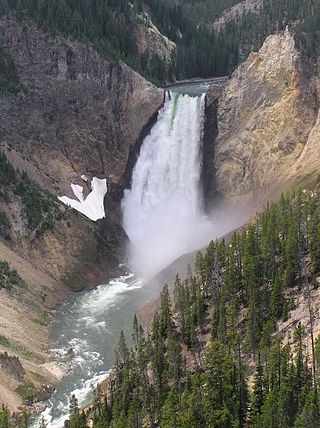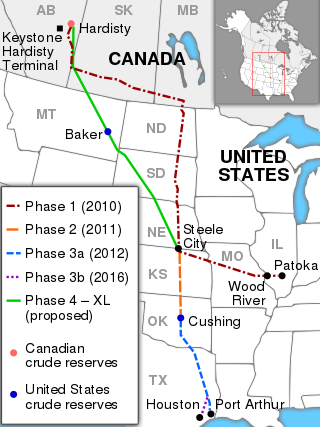
A pipeline is a system of pipes for long-distance transportation of a liquid or gas, typically to a market area for consumption. The latest data from 2014 gives a total of slightly less than 2,175,000 miles (3,500,000 km) of pipeline in 120 countries around the world. The United States had 65%, Russia had 8%, and Canada had 3%, thus 76% of all pipeline were in these three countries. The main attribute to pollution from pipelines is caused by corrosion and leakage.
Koch, Inc. is an American multinational conglomerate corporation based in Wichita, Kansas, and is the second-largest privately held company in the United States, after Cargill. Its subsidiaries are involved in the manufacturing, refining, and distribution of petroleum, chemicals, energy, fiber, intermediates and polymers, minerals, fertilizer, pulp and paper, chemical technology equipment, cloud computing, finance, raw materials trading, and investments. Koch owns Flint Hills Resources, Georgia-Pacific, Guardian Industries, Infor, Invista, KBX, Koch Ag & Energy Solutions, Koch Engineered Solutions, Koch Investments Group, Koch Minerals & Trading, and Molex. The firm employs 122,000 people in 60 countries, with about half of its business in the United States.

The Yellowstone River is a tributary of the Missouri River, approximately 692 miles (1,114 km) long, in the Western United States. Considered the principal tributary of upper Missouri, via its own tributaries it drains an area with headwaters across the mountains and high plains of southern Montana and northern Wyoming, and stretching east from the Rocky Mountains in the vicinity of Yellowstone National Park. It flows northeast to its confluence with the Missouri River on the North Dakota side of the border, about 25 miles (40 km) west of Williston.
Enbridge Inc. is a multinational pipeline and energy company headquartered in Calgary, Alberta, Canada. Enbridge owns and operates pipelines throughout Canada and the United States, transporting crude oil, natural gas, and natural gas liquids, and also generates renewable energy. Enbridge's pipeline system is the longest in North America and the largest oil export pipeline network in the world. Its crude oil system consists of 28,661 kilometres of pipelines. Its 38,300 kilometre natural gas pipeline system connects multiple Canadian provinces, several US states, and the Gulf of Mexico. The company was formed by Imperial Oil in 1949 as the Interprovincial Pipe Line Company Limited to transport Alberta oil to refineries. Over time, it has grown through acquisition of other existing pipeline companies and the expansion of their projects.

PetroChina Company Limited is a Chinese oil and gas company and is the listed arm of state-owned China National Petroleum Corporation (CNPC), headquartered in Dongcheng District, Beijing. The company is currently Asia's largest oil and gas producer. Traded in Hong Kong and New York, the mainland enterprise announced its plans to issue stock in Shanghai in November 2007, and subsequently entered the constituent of SSE 50 Index. In the 2020 Forbes Global 2000, PetroChina was ranked as the 32nd-largest public company in the world.

TC Energy Corporation is a major North American energy company, based in the TC Energy Tower building in Calgary, Alberta, Canada, that develops and operates energy infrastructure in Canada, the United States, and Mexico. The company operates three core businesses: Natural Gas Pipelines, Liquids Pipelines and Energy.
The Enbridge Pipeline System is an oil pipeline system which transports crude oil and dilbit from Canada to the United States. The system exceeds 5,000 kilometres (3,100 mi) in length including multiple paths. More than 3,000 kilometres (1,900 mi) of the system is in the United States while the rest is in Canada and serves the Athabasca oil sands production facilities. Main parts of the system are 2,306-kilometre-long (1,433 mi) Canadian Mainline and 3,057-kilometre-long (1,900 mi) Lakehead System. On average, it delivers 1.4 million barrels per day of crude oil and other products to the major oil refineries in the American Midwest and the Canadian province of Ontario. The Canadian portion is owned by Enbridge, while the U.S. portion is partly owned by that company through Enbridge Energy Partners, LP, formerly known as Lakehead Pipe Line Partners and Lakehead Pipe Line Company.

The Standing Rock Reservation lies across the border between North and South Dakota in the United States, and is inhabited by ethnic "Hunkpapa and Sihasapa bands of Lakota Oyate and the Ihunktuwona and Pabaksa bands of the Dakota Oyate," as well as the Hunkpatina Dakota. The Ihanktonwana Dakota are the Upper Yanktonai, part of the collective of Wiciyena. The sixth-largest Native American reservation in land area in the US, Standing Rock includes all of Sioux County, North Dakota, and all of Corson County, South Dakota, plus slivers of northern Dewey and Ziebach counties in South Dakota, along their northern county lines at Highway 20.

The Colonial Pipeline is the largest pipeline system for refined oil products in the U.S. The pipeline – consisting of three tubes – is 5,500 miles (8,850 km) long and can carry 3 million barrels of fuel per day between Texas and New York.

Kinder Morgan, Inc. is one of the largest energy infrastructure companies in North America. The company specializes in owning and controlling oil and gas pipelines and terminals.
Energy Transfer LP is an American company engaged in the pipeline transportation, storage, and terminaling for natural gas, crude oil, NGLs, refined products and liquid natural gas. It is organized under Delaware state laws and headquartered in Dallas, Texas. It was founded in 1996 by Ray Davis and Kelcy Warren, who remains Executive Chairman.

The Keystone Pipeline System is an oil pipeline system in Canada and the United States, commissioned in 2010 and owned by TC Energy and, as of March 2020, the Government of Alberta. It runs from the Western Canadian Sedimentary Basin in Alberta to refineries in Illinois and Texas, and also to oil tank farms and an oil pipeline distribution center in Cushing, Oklahoma.

The Dakota Access Pipeline Protests, also known by the hashtag #NoDAPL, were a series of grassroots Native American protests against the construction of the Dakota Access Pipeline in the northern United States that began in April 2016. Protests ended on February 23, 2017 when National Guard and law enforcement officers evicted the last remaining protesters.
The Agua Prieta pipeline is a natural gas pipeline project by Sempra Energy that aims to move natural gas from the U.S. state of Arizona to the Mexican states of Sonora and Sinaloa. The pipeline will cross the Yaqui River, the main water source for the Yaqui, an indigenous tribe. The pipeline has an approximate length of 833 km upon completion, approximately 90 km of which will go through Yaqui territory. Some of the Yaqui community strongly oppose the pipeline and have campaigned against it.
The Bayou Bridge Pipeline (BBP) is a 162.5-mile crude oil pipeline from Lake Charles, Louisiana to St. James, Louisiana by Bayou Bridge, LLC, a subsidiary of Energy Transfer Partners. Communities directly impacted by the pipeline voiced health, economic, and environmental concerns. They filed a lawsuit in opposition to the project and asked the Army Corps of Engineers for an Environmental Impact Statement. The Corps refused to do so and approved the project on 15 December 2017. Water protectors at L'eau Est La Vie camp consistently disrupted construction of the BBP for most of 2018, causing delays and millions of dollars in added cost to the project. They raised environmental justice and social justice issues and concerns about the pipeline's contribution to climate change. The pipeline was eventually completed in April 2019.

The Mountain Valley Pipeline (MVP) is a completed natural gas pipeline constructed from northwestern West Virginia to southern Virginia. The MVP is 303 miles (488 km) long, and there is also a proposed Southgate Extension which will run 75 miles (121 km) from Virginia into North Carolina. The completed pipeline has a capacity of 2 million dekatherms (Dths) of natural gas per day, with gas produced from the Marcellus and Utica shale formations.
The Byhalia Pipeline, also referred to as the Byhalia Connection Pipeline, was a proposed 49-mile crude oil pipeline project in Memphis, Tennessee. Proposed by two companies, Plains All American Pipeline and Valero Energy, it was canceled in July 2021 after months of activism and resistance from organizations including Memphis Community Against the Pipeline (MCAP), Protect Our Aquifer, the Memphis and Mid-South Chapter of The Climate Reality Project, and other partnered organizations. Opposition to the pipeline was based primarily around impact concerns for the Memphis drinking water aquifer below the intended pipeline location that supplies drinking water to approximately 1 million people. Plans for the Byhalia Connection pipeline project were called off after a statement from Plains All American Pipeline director of communications that the project was no longer being pursued "primarily due to lower U.S. oil production resulting from the COVID-19 pandemic".

The Dakota Access Pipeline (DAPL) or Bakken pipeline is a 1,172-mile-long (1,886 km) underground pipeline in the United States that has the ability to transport up to 750,000 barrels of light sweet crude oil per day. It begins in the shale oil fields of the Bakken Formation in northwest North Dakota and continues through South Dakota and Iowa to an oil terminal near Patoka, Illinois. Together with the Energy Transfer Crude Oil Pipeline from Patoka to Nederland, Texas, it forms the Bakken system. The pipeline transports 40 percent of the oil produced in the Bakken region.











